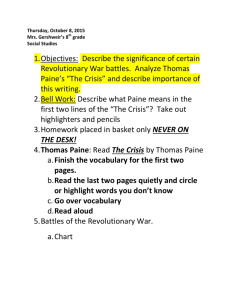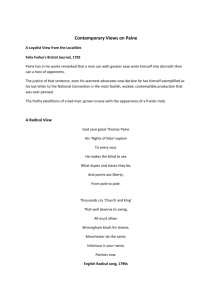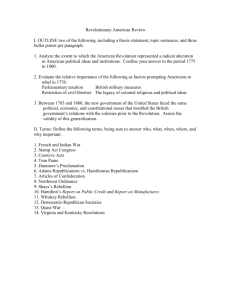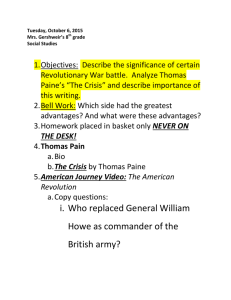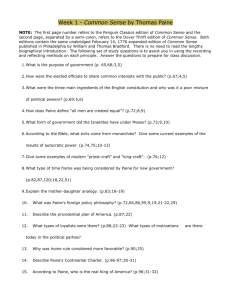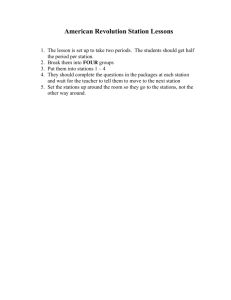Thomas Paine Seminar Powerpoint (1)
advertisement
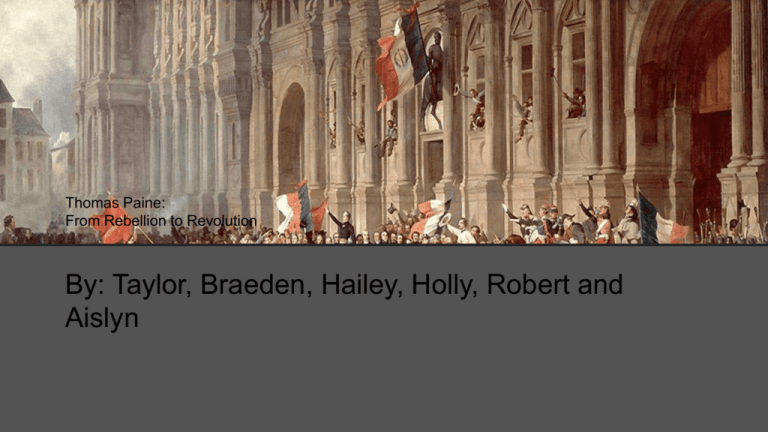
Thomas Paine: From Rebellion to Revolution By: Taylor, Braeden, Hailey, Holly, Robert and Aislyn Table of Contents ● ● ● ● ● ● Biography of Thomas Paine Key Concepts and Ideals of Thomas Paine Questions for the Class Glossary Conclusion Bibliography Thomas Paine: 1737-1809 ● Born February 9th 1737 in Norfolk England ● Paine was an unsuccessful man while working in England. ● Paine met a man named Benjamin Franklin who talked him into emigrating to America ● Once in Philadelphia, Paine became a publicist where he wrote many anti-slavery pieces ● “Without the pen of the author of Common Sense, the sword of Washington would have been raised in vain” John Adams TH Thomas Paine in America ● Wrote Common Sense (1776) ● Attacked loyalty to the British King ● Pointed out the positives that would come from independence ● Persuaded people to join the American side (Patriots) and advocated for the rights of Americans’ freedom from British oppression ● These ideas/this document would inspire the French to start their own revolution BS Thomas Paine Back in Europe ● After the American Revolution, Paine returned to England but shortly after returning home the French Revolution started and he became very involved in it ● He published some of his most famous writings such as The Rights of Man where he defended the French revolution and rivaled Edmund Burke’s beliefs on the conflict. ● He was later jailed for not voting towards Louis XVI’s death. While in jail he published The Age of Reason where he reflected the achievements of the Age of TH Enlightenment Key Concepts Divine Right ● It is clear that Paine disagrees with the notion of Divine Right ● Notes that while Europe has had ‘revolutions’, nothing has changed other than the face of the ruler ● Thinks it is important to break ties with the past and go against the ‘collective wisdom’ of hereditary monarchs HZ Divine Right Continued ● Paine borrows from Rousseau - man was born free and hereditary, monarchical government is keeping him in chains and stripping his rights ● Boasts about Republican governments in America (and references to the struggles in France) to prove that monarchical governments are regressive, not progressive ● Implies that monarchical governments rule only thinking about themselves, not the masses HZ Inalienable Rights Inalienable Rights: rights that are unable to be taken away from or given away by the possessor “Men are born and always continue free, and equal in respect of their rights.” HM Consent ● Both Paine and Locke had a heavy influence on American government (Declaration of Independence, Constitution) ● Paine borrows Locke’s concept of a government needing consent to be legitimate ● The republican system of government has adopted the protection of inalienable rights, in favour of keeping the masses happy HZ Consent Continued “Sovereignty, as a matter of right, appertains to the Nation only, and not to any individual; and a Nation has at all times an inherent indefeasible right to abolish any form of government it finds inconvenient, and establish such as accords with its interest, disposition and happiness.” (469) HZ Consent Continued ● “Old World” governments didn’t think that the American Republican system would work and are shocked that it is producing positive results o Produces results because it has the consent of the people ● States there is a “barbarous distinction” between Kings and their subjects HZ Monarchy is Not Necessary for Success “In this view of government, the republican system, as established by America and France operates to embrace the whole of a Nation; and the knowledge necessary to the interest of all parts is to be found in the center.” HM Monarchy is Not Necessary for Success Continued “When we study the wretched condition of man under the monarchical and hereditary system of government...it becomes evident that those systems are bad, and that a general revolution in the principle and construction of government is necessary.” HM Monarchy is Not Necessary for Success Continued “All the monarchical governments are military. War is their trade, plunder and revenue their objects.” All the monarchies do is start wars Only call peace because they are tired of fighting each other Don’t resolve conflicts, they just cause them HM Republicanism Definition: Republicanism is the ideology of governing a society or state as a republic (la. res publica), where the head of state is a representative of the people who hold popular sovereignty rather than the people being subjects of the head of state. RO Republicanism Continued ● No King, elected individuals ran the country ● Country for the people by the people ● France and the United States of America being two examples of Republics ● Was at the core of Paine’s writing ● Based on the idea that the people will make the right decisions ● Often criticised with being inefficient and ignorant. RO Rebellion to Revolution ● Paine wanted to use The Rights of Man as a way to change the perception of Revolutions around the world seen not only in The Rights of Man but also in other works such as The Crisis ● He wanted them to be seen as a change for the better ● He wanted to convince people to fight for their rights RO Rebellion to Revolution Continued "These are the times that try men's souls, the summer soldier and the sunshine patriot will, in this crisis, shrink from the service of their country; but he that stands by it now, deserves the love and thanks of man and woman." -The Crisis RO Pro-Change ● Believed in pro-change as long as it was in the interest of society as a whole o Paine thought that change needed to benefit the group as a whole in order for it to be acceptable It could not benefit just one family or man Community Family AH Pro-Change Continued ● Believed that change, especially the change that came from the American Revolution, was an act of nature o “...where the principles of universal reformation could begin, so also was it best in the natural world. An assemblage of circumstances conspired, not only to give birth, but to add gigantic maturity to its principles.” AH Pro-Change Continued “Reason, like time, will make its own way, and prejudice will fall in a combat with interest. If universal peace, civilization, and commerce, are ever to be the happy lot of man, it cannot be accomplished but by a revolution in the system of governments.” (472) AH Pro-Change Continued “The revolutions which formerly took place in the world, had nothing in them that interested the bulk of mankind. They extended only to a change of persons and measures, but not of principles, and rose or fell among the common transactions of the moment.” (472) AH Opposing Beliefs: Edmund Burke - Believed that the French revolution was and would lead to complete anarchy. - Felt the French revolution was not the same as the American revolution and it was just a way of being different from British control. That it was just a radical revolution to change old traditions not an actual revolution like the American revolution was. TH Discussion Questions Question 1 If you were in the shoes of an 18th century French Citizen, how would you react to the Revolution? RO Question 2 Thomas Paine makes a lot of references to what the Americans have done with their political system. Overall he has nothing but praise for how the new nation handled their revolution. Is there anything that he purposely leaves out about the American Revolution? HM Question 3 Not long ago, Scotland held a referendum to see if they should continue to be a part of Great Britain. If Paine was alive now, do you think he would have been pro- or antiseparation? If he were to write another document regarding the referendum, what sort of rights or laws do you think he would touch on? Explain. HZ Question 4 Would Thomas Paine’s views expressed in his writing The Rights of Man, work in today’s world? (Ex. Afghanistan) explain your reasoning. TH Question 5 Are Thomas Paine’s opinions and views on monarchical and tyrannical governments of the “old world”, correct? Why or why not? Are there successful “old world” governments in the modern day? AH Question 6 Americans are proud of themselves and very patriotic. Do you think Paine’s ideas are still present in America today? B Question 7 In 500 years from now, will Thomas Paine’s ideas and beliefs still be a relevant thing to look at or do you feel like the ideas expressed in The Rights of Man will be obsolete and no longer apply to that time? Explain. TH Glossary Glossary Terms Aggrandizement: verb – to make/appear greater; to increase the status/wealth/power of Alteration: noun - the action or process of altering or being altered. Antiquity: noun - the ancient past, esp. the period before the Middle Ages; great age Assemblage: noun - A collection or gathering of things or people. Barbarous: adjective - savagely cruel; exceedingly brutal. Glossary Terms Continued Contrivance: noun – something that is artificially and cleverly created/imposed with the intention of having things in a story happen in a way that does not seem possible/believable Disposition: noun - a person's inherent qualities of mind and character • [ often with infinitive ] an inclination or tendency Dispossessed: verb [ with obj. ] - deprive (someone) of something that they own, typically land or property Glossary Terms Continued Emolument: formal noun – a salary or return earned through employment Hessian: noun – a person living in the state of Hesse in Western Germany Ideals: noun - a standard of perfection; a principle to be aimed at. Indefeasible: adjective - not able to be lost, annulled, or overturned. Glossary Terms Continued Intrigues: verb - [ with obj. ] arouse the curiosity or interest of; fascinate Miscarriage: noun - an unsuccessful outcome of something planned Redress: verb – to set right; to make up for; to enact reparation for Usurpation: verb – to take and hold (wealth, power, etc.) that does not belong to you illegally or by force Conclusion ● ● ● ● ● ● Divine right Consent Monarchy is not necessary for success Republicanism Rebellion to revolution Pro-change BS
